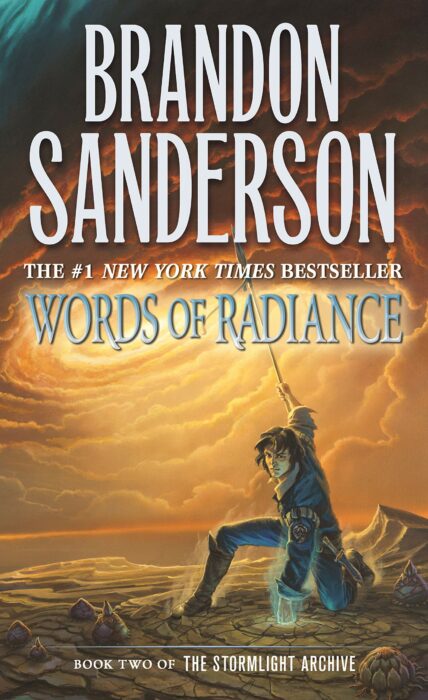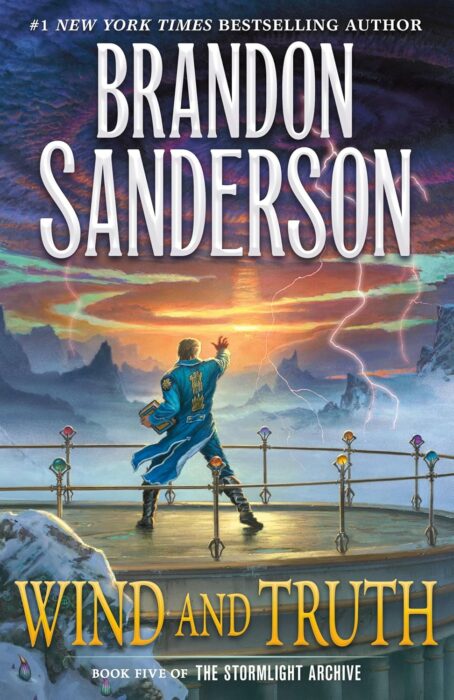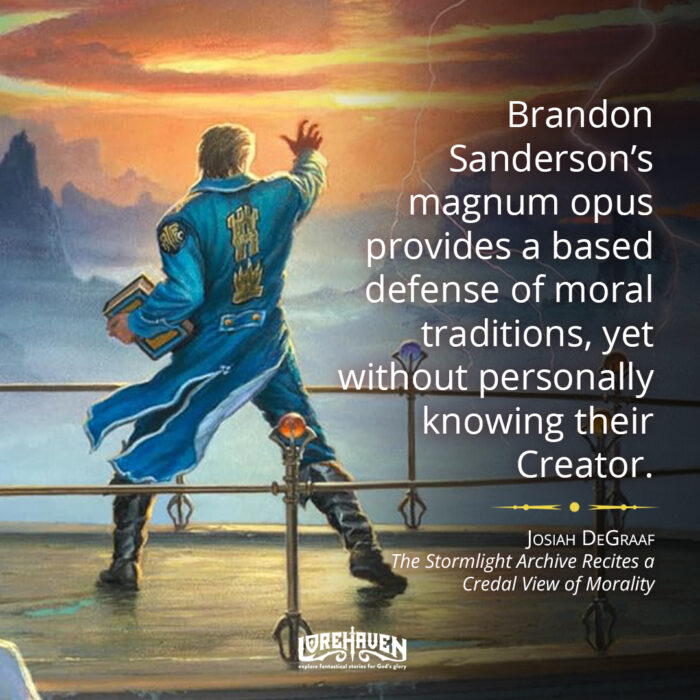The Stormlight Archive Recites a Credal View of Morality
If you’re a fantasy reader, you can’t avoid Brandon Sanderson.1
His popularity combined with his distinct approach to magic systems and worldbuilding has profoundly shaped the genre. This leads even readers who haven’t picked up Sanderson to encounter modern fantasy worlds shaped by his approach to magic systems.
Last month, he concluded the first half of what he’s called his magnum opus, The Stormlight Archive, a projected series of ten tomes, each over 1,000 pages and following a group of characters in their attempt to save their world from an evil god. There’s a lot one could write about this series and the many character arcs and themes explored over the Archive’s first 6,000 pages.
Yet one particular feature has stood out to me as a Christian reader: the credal nature of its magic system.

Words of Radiance, Brandon Sanderson (cover art: Michael Whelan)
The Stormlight Archive ties moral truths to magical development
The Stormlight Archive follows several characters’ attempt to resurrect the Knights Radiant, an ancient set of ten orders who use magical abilities to defend others from the Voidbringers. Each order has unique powers. And, most relevant to this article, each order demands oaths from its members if they are to unlock their abilities.
It begins with a common oath all orders share in common: “Life before death. Strength before weakness. Journey before destination.” After that first oath, each order has a different set of four oaths unique to that order’s calling. Windrunners swear to protect those who can’t protect themselves. Edgedancers swear to remember those who have been forgotten. Stonewards swear to stand when others fail.
In many ways, these aren’t just oaths: they’re creeds. In the real world, the early church formulated creeds to define their beliefs and distinguish true Christianity from the pernicious heresies that had crept up in that day. Reciting a creed wasn’t only a personal vow—this expressed an identification with fellow believers. And barring a few controversies about the filioque clause or the descent clause, these creeds have remained unchanged to this day. When we recite the Apostle’s Creed, we not only display unity with the local assembly of believers, but with the historical church.
The oaths of The Stormlight Archive meaningfully serve a similar function within the world of Roshar. While short enough that “mini-creeds” may be a better description, the oaths of each order serve to not only commit characters to particular ideals, but also unite them with fellow members of their order, living and deceased.
By creating such a system, Sanderson points to the value of upholding moral traditions.
The strengths of the Stormlight oaths
Our modern culture doesn’t often celebrate the idea of moral traditions. Critics charge these with being outdated and discouraging self-expression. Nor do these traditions’ rigid nature seem to account for nuances of the modern world.
The moral framework presented in The Stormlight Archive counters such claims. Against a modern culture that encourages self-expression at the cost of rich traditions, The Stormlight Archive depicts long-standing, unchanging oaths as attractive and powerful. Committing oneself to a particular belief and reciting the same words as thousands of other people have doesn’t diminish a character. It provides clarity and power. As characters search to recover the forgotten words of the oaths, our hearts are moved to more deeply value ancient truths. Because it’s those truths that ultimately enable each character to resist the forces of darkness.
These truths also ward against pernicious moral reasoning. The final saying of the orders’ shared oath reads “journey before destination.” And over the course of the series, this is regularly interpreted as opposing an “ends justifies the means” methodology. How we fight is just as important as what we fight for. Or, as a mentor explicitly states in Wind and Truth, “the destination must not undermine the journey” (page 1277). The series features several characters learning this truth the hard way. This first oath is foundational for a reason. Without an understanding that journey comes before destination, vowing to uphold unchanging moral truths hardly makes sense. Sanderson’s moral framework in this series is strictly anti-utilitarian.
And in a world like ours, an anti-utilitarian ethic that showcases the power of a universal moral code is what we need.
 The weaknesses of the Stormlight oaths
The weaknesses of the Stormlight oaths
While there’s much to appreciate and value in Stormlight’s oath-based magic and virtue, Sanderson’s sensibilities as a liberal Mormon do seep through.
These mini-creeds lack any claims about divinity. Characters’ belief in God is irrelevant. This feels particularly striking in a world where this credal magic system is created by a pair of minor deities, and God himself existed before he was betrayed and killed. In spite of this, while moral claims are presented as vital beliefs, theological claims matter less.
This isn’t coincidental. John Ehrett at Ad Fontes makes a compelling case that this theme is baked throughout Sanderson’s Cosmere. Sanderson’s vision of a cosmos inhabited by all-too-human gods evokes the Mormon dogma that “as man now is, God once was; as God now is, man may be.” And if gods possess human foibles and weaknesses, as Sanderson’s do, why should worship be objectively required, much less written into a creed?
As Christians, while there’s much to appreciate in Sanderson’s unapologetic defense of objective moral traditions,2 we ought to also recognize the wisdom of our theological forefathers in rooting Christian creeds in the nature of God Himself. Morality can’t healthily exist as an isolated set of moral beliefs. It is intrinsically rooted in who God is. When morality is divorced from the person of Christ, it far too quickly becomes legalistic, a conclusion that some of Stormlight’s characters unintentionally seem to be learning by the end of Wind and Truth.
After all, the value of oaths and creeds depends on the One to whom they are spoken. Without a God worthy of our devotion and vows, our best-meant words will all too readily find themselves lacking.































Wow, this is simpleton MAGA. Except maybe it should be MACA. I am a Christian raised in a Christian home. Your cherry picking of themes is simpleton. I have been in a monogamous, heterosexual relationship for over thirty years. You would applaud me except I reject you. I think every version of the bible has a ” cast ye not the first stone” version. Most MAGA like you ignore that. You say you are Christian. But non denominational apparently other than ” better than mormans” Go on your fantasy crusades but please leave true authors to pursue their beliefs without your stones. Sickening…
Not sure who the “Mormans” are. Anyway, this comment doesn’t engage the article’s actual content at all.
This was an excellent article Josiah and you gave both the pros and the cons of the books very well. I’ve heard a lot about the Stormlight Archives and I love seeing other authors dive down into the meat and bones of story. Well done applause
Thanks, Allie!
Great stuff, Josiah, as always.
It’s long been my lament-
Where can I find great fantastical stories (as Sanderson’s certainly are) but which are written from a Christian worldview.
Which speak to the real Majesty and Mystery.
Which are logically and theologically consistent with the world, and the unseen world, which I know.
Which not only entertain but edify.
. . . and if I can add one last wish to the list? Especially those written for adults. (Maybe even adult males?)
J. A., you’re in the right place. Try the newly reforged Book Search right here on this site:
Lorehaven Book Search
We’ve collected 1,500+ listed and 330+reviewed Christian-made fantastical novels. You can filter these by genre, reader, and specific story keywords like dragons or spaceships.